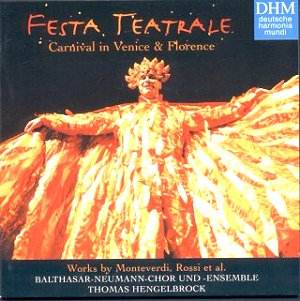Various Festa Teatrale - Carnival in Venice and
Florence
 Thomas Hengelbrock directing
Balthasar-Neumann-Chor und-Ensemble
Thomas Hengelbrock directing
Balthasar-Neumann-Chor und-Ensemble
 DHM 05472 77520 2 [61:56]
DHM 05472 77520 2 [61:56]

Masquerades, ballets and carnival scenes by Pietro Antonio Giramo, Giovanni
Legrenzi, Claudio Monteverdi, Francesco Lambardi, Deigo Ortiz, Orazio Vecchi,
Salamon Rossi, Tarquinio Merula, Giovanni Giacomo Gastoldi.
This programme takes music by nine composers to create a fantasia based upon
the famous carnivals of Florence and Venice of the 17th century.
The booklet tells us that Thomas Hengelbrock "found the vivid drama of this
music and its dance rhythms so infectious that he compiled a concert programme
and joined forces with the director and scene designer Petra Weikert to create
a staged performance." The musicians and choir appeared in costume, "as
characters from the comedia dell'arte and as allegorical or mythological
figures, turning the exuberance and melancholy of the seicento into living
reality for an enthusiastic audience." This album is not a live recording,
but a studio recreation of the event, and it has to be said that something
seems to have been lost. The wild exhilaration of the performance, such that
one wishes DHM had chosen to release a video or DVD of the live event.
In this concert the individual composers are much less important than the
purpose behind the selection of the music, and than the sound created by
Thomas Hengelbrock with the Balthasar Neumann Choir and Ensemble. All but
one (Ortiz) wrote in the first half of the 17th century, though
some only just made it into the new century, and any differences in style
are less significant than the perhaps too formal and staid clothes in which
the music is here dressed.
The concert begins and end with versions, so similar as to be functionally
identical, of Festa, riso gioco e gioia by Pietro Antonio Giramo,
a vibrant dance song from 1620 which sets its agenda in no uncertain terms:
the first line is "Party, laughter, fun and happiness." Here is Carnival
time, all set for assorted frolics, folly and fantasy with music, costume,
song and dance playing a major part. The tune is memorable, with enthusiastic
choral singing and the sort of infectious rhythm guitar more usually associated
with folk, and these days, rock music. Strange then that after setting such
a cheery agenda, the second song should be the most mournful on the disc.
The ballad Lumi, potete piangere is not in the least festive, though
this sad lament, beautifully sung by Dorethee Mields, is one of the highlights
of the set. From here the programme essentially alternates the joy and
heartbreak. Indeed, the longest piece, Maschereta della Malinconia, &
Allegrezza by Orazio Vecchi is an elaborate debate between Melancholy
and Joy and occupies almost 9 minutes at the centre of the programme. Joy
wins, with Melancholy ending by asking to learn "something of the delights
of love." Now that is bound to end in tears, and sure enough there is more
romantic misery later on.
The most music is by Montiverdi, who provides four pieces, accounting for
almost a third of the playing time. Questi vaghi concenti is an elaborate
study in romantic longing, which complex choral writing weaving an enchanting
spell. The composer's Vorrei baciarti, o Filli is a sombre yet more
hopeful love song, with two further number in similar vein completing his
quartet, Damigella tutta bella O Rosetta, che rosetta being the most
colourfully invigorating.
The flute piece, Sonata in dialogo detta La Viena by Salamon Rossi
has a most attractive sound and some appealing improvisation on the pretty
main theme. Tarquino Merula's Chiacona is a more danceable instrumental
piece. The songs generally concentrate on passionate declarations of frustrated
desire - presumably those who are having their desires satisfied are too
busy to write songs - to which are added the occasional dash of paganism.
Francesco Lambardi's Canto d'Amore is music for a courtly pageant
involving Venus and Cupid.
There is a lot of enjoyable music, though I can't help but think that the
more lively numbers are suffering from an overly restrained studio production,
such that the plaintive pieces come out best. The cover photo promises something
much more fiery than is delivered, and perhaps the live version is the thing
to experience if one can. That really might deliver the promise of "Party,
laughter, fun and happiness." On the plus side, the extensive notes by Joachim
Steinheuer are especially informative, in not particularly easy to relate
directly to each individual piece.
Reviewer
Gary Dalkin


![]()